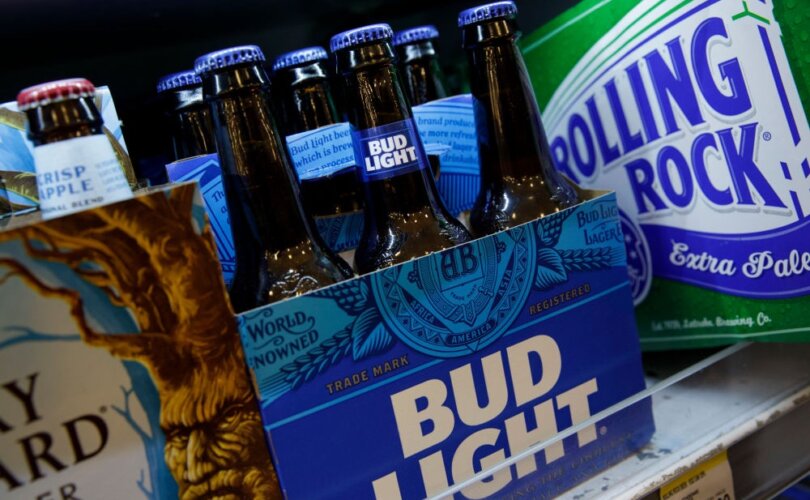So, to all those corporate decision-makers out there, here’s a revolutionary idea: maybe, just maybe, instead of alienating your beer-drinking clientele, you could try focusing on, I don’t know, making a brew that people actually want to drink. Crazy, right? It’s almost like the secret to success isn’t found in preachy ad campaigns, but in, well, the beer itself. But hey, what do I know? I’m just here sipping on a different light beer, watching the corporate world learn its lessons, one Bud Light at a time. Cheers to that!
In recent political annals, an astonishing victory stands tall: the resounding social conservative repudiation of Bud Light’s appointment of transgender activist Dylan Mulvaney as their brand ambassador. The ripples of this success have transformed it into a benchmark for boycott achievements. As documented by the New York Post, this is a story of remarkable consequences:
The Post-Mulvaney Fallout: Anheuser-Busch Distributors Face Harsh Reality
In the wake of the Dylan Mulvaney controversy, Anheuser-Busch distributors find themselves grappling with formidable Bud Light losses. The aftermath has seen them relinquish attempts to win back estranged patrons, as insiders reveal. Enduring four months of workforce contraction, coupled with the sting of a 25% plummet in Bud Light sales, these wholesalers confront an inescapable truth: a significant clientele fraction is irreversibly lost. The task at hand pivots to nurturing a fresh generation of beer enthusiasts.
Amid this tectonic shift, an anonymous executive from a Texas-based beer distributor remarked, “Consumers have cast their ballots, opting to part ways with Bud Light, and this trajectory is irrevocable. The prospect of a substantial portion returning seems remote.”
A Predicted Downturn: Charting Bud Light’s Sales Trajectory
Contrary to conventional optimism, industry insiders prognosticate a continued ebb in Bud Light sales. Endeavors to rejuvenate the brand’s blue-collar essence via conventional marketing endeavors appear to fall short. Bud Light, once emblematic of inclusive values, now epitomizes overzealousness and corporate aloofness in the eyes of consumers. Its association with incessant promotion of the LGBT cause across societal realms exacerbates this perception. Discontent has galvanized, coalescing around this singular brand. Expressing disdain for Bud Light serves as a virtuous gesture on the Right, much akin to endorsing transgenderism on the Left.
The Bud Light Boycott: A Spontaneous Groundswell
What distinguishes the Bud Light boycott is its spontaneous emergence. While a cadre of conservative commentators did advocate shunning Bud Light—owing credit to the likes of Daily Wire hosts for their considerable influence—this iconic American brand didn’t instantaneously become synonymous with the LGBT agenda due to a handful of conservative voices. Rather, the movement was a manifestation of a vast consumer base that had been inundated with transgender messaging repeatedly, until reaching a tipping point and retaliating emphatically.
Manifesting Discontent: Social Media Phenomena
This groundswell translated into social media manifestations, epitomized by visuals of individuals discharging assault rifles at stacks of Bud Light crates and viral footage capturing unoccupied Bud Light beer stations during baseball games. These actions were emblematic of a collective endeavor to dispatch a potent message to corporate America: an exhortation to recalibrate their priorities.
A Backlash Unfolds: The Corporate Jolt
Corporate executives’ astonishment at the fervent backlash is not unfounded. Amidst a landscape where numerous conglomerates have embraced some variation of LGBT advocacy for half a decade or more, the punitive reception of Bud Light’s campaign stands as an anomaly. Its appeal as a blue-collar staple might account for this dissonance, as working-class beer aficionados are averse to condescension and sanctimony. Additionally, the exponential surge in corporations championing LGBT causes necessitated an eventual counterforce. Bud Light unwittingly served as the lightning rod, enabling aggrieved individuals to channel their vexation. Given the ease of switching allegiances to alternative light beers, Bud Light faced a severe consumer exodus.
The Silent Majority: Asserting Influence
Of paramount significance, the Bud Light boycott has reverberated as a wake-up call across corporate domains. Propagating LGBT ideologies can no longer be presumed a guaranteed triumph for companies. The stark reality that consumer backlash can dent a conglomerate’s profits by billions underscores the muted influence of the silent majority. Dylan Mulvaney’s gender identity, for instance, does not universally resonate, as the Bud Light boycott attests. It serves as a poignant reminder to corporate strategists ensconced in their insular boardrooms that authentic resonance with the wider populace is indispensable for financial prosperity.
In conclusion, the seismic reverberations of the Bud Light boycott have reshaped the corporate landscape, emphasizing the value of authentic engagement over insular narratives. This paradigm shift underscores that while the world of corporate consultation may laud diversity, equity, and inclusion (DEI) doctrines, the genuine world remains steeped in heterogeneity. To attain lasting success, corporations must endeavor to align with the broader sentiment, steering clear of condescension and treating their consumer base with the respect it duly deserves.







